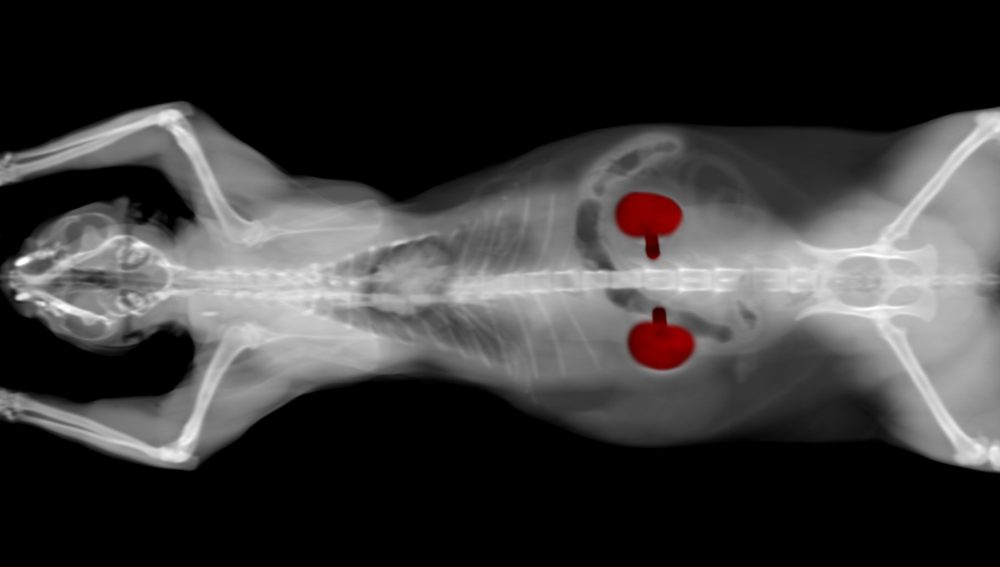
Pets affected by stage one and two chronic kidney disease (CKD) rarely exhibit signs, although early diagnosis is critical for successful treatment. Our Harbor Pines Veterinary Center team explains why screening tests are so important, and offers diagnostics to improve your four-legged friend’s prognosis.
Chronic kidney disease is prevalent in pets
The International Renal Interest Society (IRIS) reports that an estimated 1% of dogs and 1% to 3% of cats are affected by CKD. Prevalence increases with age, especially in cats, where CKD is seen in approximately 80% of the senior cat population. Conditions that can increase your pet’s CKD risk include heart disease, periodontal disease, diabetes, infectious diseases, and obesity.
The kidneys are responsible for numerous essential body functions, and dysfunction can result in significant problems, including:
- Toxin accumulation in the bloodstream
- Inability to conserve water by producing concentrated urine
- Inability to regulate blood pressure, leading to hypertension (i.e., high blood pressure)
- Protein loss in the urine (i.e., proteinuria)
- Reduced red blood cell (RBC) production
- Improper body pH that interferes with vital metabolic processes
- Inability to properly balance electrolytes and minerals
Chronic kidney disease screening tests for pets
Pets tend to hide their vulnerabilities. If their ancestors exhibited weakness, they often became a predator’s next meal, and while your pet doesn’t need to evade saber-toothed tigers, they retain these wild instincts. Therefore, when they feel unwell, they often continue to behave completely normal and can delay diagnosis of a serious health condition. Our Harbor Pines Veterinary Center team recommends regular wellness screenings to help detect conditions, such as CKD, in the early stages, when they are easier to manage. A veterinarian should evaluate adult pets at least once a year, and senior pets, who are at higher risk, every six months. Screening tests that provide information about your pet’s kidney health include:
- Complete blood count (CBC) — A CBC evaluates your pet’s RBCs, white blood cells (WBCs), and platelets. The kidneys normally produce erythropoietin, the hormone responsible for signaling the bone marrow to produce RBCs. In CKD, sufficient erythropoietin is often not produced, leading to anemia.
- Blood urea nitrogen (BUN) — BUN is a waste product that is typically filtered by the kidneys. Elevated levels can indicate kidney dysfunction, but the levels can also be affected by the pet’s diet, exercise, and muscle mass. In addition, a large amount of kidney tissue must be damaged before BUN levels rise.
- Creatinine — Creatinine is another waste product typically filtered by the kidneys, and elevated levels usually indicate kidney dysfunction. Similar to BUN, kidney function must deteriorate by about 70% before creatine levels rise. Blood chemistry profiles that only assess BUN and creatinine can’t detect early stage CKD.
- Symmetric dimethylarginine (SDMA) — At Harbor Pines Veterinary Center, we also assess your pet’s SDMA, which is an amino acid produced when protein breaks down. SDMA is less affected by other influencing factors and increases at about 25% of kidney function deterioration. Therefore, elevations can be observed 12 to 36 months before BUN and creatinine levels change, which allows our team to detect your pet’s CKD earlier.
- Urinalysis — Your pet’s urine evaluation provides valuable information about your pet’s kidney health. CKD inhibits the kidneys’ ability to produce concentrated urine, so samples are usually dilute. In addition, the kidneys typically preserve proteins, and urine samples from CKD patients often contain protein.
Other diagnostics for chronic kidney disease in pets
If your pet’s blood and urine values indicate CKD, other diagnostics we may recommend include:
- Infectious disease testing — Leptospirosis is a common bacterial infection that affects the kidneys, especially in dogs. Testing is important so that treatment can address the infection as soon as possible and because leptospirosis can be transmitted to other pets and people through an infected pet’s urine.
- Urine culture — A urine culture is important to determine if a urinary tract infection is contributing to kidney dysfunction.
- X-rays — X-rays can help our team visualize the kidney silhouette and determine if stones or a tumor are present.
- Ultrasound — Ultrasound can help evaluate the kidney structure and may be necessary to determine the severity of your pet’s CKD.
- Blood pressure — High blood pressure commonly occurs in relation to CKD, and can exacerbate disease progression. We evaluate your pet’s blood pressure to determine if they need medication to control hypertension.
Chronic kidney disease management for pets
CKD is incurable, but treatments are available that will improve your pet’s quantity and quality of life, especially when the condition is detected early. Management strategies we may suggest include:
- Hydration — Maintaining your pet’s hydration is critically important. We may administer intravenous fluids if your pet is severely dehydrated, and they will likely also need subcutaneous fluids at home. Our team will explain and demonstrate this process in complete detail.
- Nutrition — Prescription renal diets, which have lower protein and phosphorus levels and often include additional antioxidants and essential fatty acids, are typically recommended for CKD pets.
- Medications — We may prescribe medication to address anemia, hypertension, nausea, elevated phosphorus levels, and decreased potassium levels.
Contact our Harbor Pines Veterinary Center team today to schedule your pet’s wellness examination, so we can ensure their kidneys are in tip tip shape.

